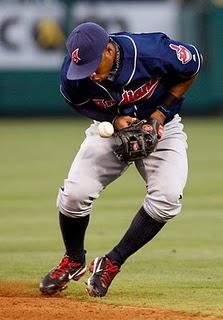Hitting is as well. Unfortunately, so is making errors.Errors are always going to be part of the game. Even the best defenders are going to drop a ball or make a bad throw every once in a while. What good teams and individual players need to prevent is what I call “compounding errors.” Here is an example.

Bobbling it is one thing,
compounding it is another.
(Photo by ChronicleOnline)
Four mistakes were made on the play and all occurred after the bobble. The first mistake was the third baseman thinking he had to hurry his throw to make up for the bobble. The second mistake was mechanical because the third baseman probably did not set his feet well enough when he rushed which caused the low throw. The third mistake was the second baseman thinking he had to rush turning the double-play and the fourth mistake was the second baseman taking his eye off the ball and trying to throw before he caught the ball.
The errors kept compounding. Good teams and players prevent errors from getting past #1. They don’t let them compound. Facing a bobble, the third baseman should have stopped it there and became even more diligent about his footwork to not compound the problem with a bad throw. The second baseman should have been more diligent about making sure of the first out, especially if the feed was a poor one. This would have prevented the dropped ball.
The late John Wooden passed on an enormous amount of wisdom in the form of quotes and sayings. One of them was “Be quick, don’t hurry.” Both players in the example “hurried” their plays which caused them to skip very important steps in the process of turning a double play. Being “quick” means being fast enough for success without skipping any of the important steps. There is a big difference between the two.

